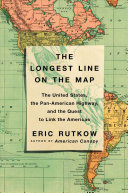2018 School Spending Survey Report
The Longest Line on the Map: The United States, the Pan-American Highway, and the Quest To Link the Americas
Scribner. Dec. 2018. 448p. maps. notes. bibliog. index. ISBN 9781501103902. $30; ebk. ISBN 9781501103926. HIST
COPY ISBN
 The Pan-American Highway is the longest road in the world, running the length of the Western Hemisphere from Prudhoe Bay in Alaska to Tierra del Fuego in South America. It symbolizes, according to Rutkow (American Canopy), a shared dream of overland connectivity. The United States that emerges from this richly detailed history is torn between goodwill and self-interest, cooperation and control. The concept of Pan-Americanism was a paradox for the United States; while it elevated Latin American countries as geopolitical equals, it ensured the exclusion of Europe by allowing America to exercise its leadership. A second theme deals with road building and its connection to U.S. visions and accomplishments in international development. Rutkow observes that the Pan-American Highway held the interest of every U.S. president from Calvin Coolidge to Jimmy Carter, it's enduring appeal bespeaking a historical strain of popular sentiment favoring hemispheric connectivity. He laments that Trump's goal is not a road to link the Americas but rather a wall to divide.
The Pan-American Highway is the longest road in the world, running the length of the Western Hemisphere from Prudhoe Bay in Alaska to Tierra del Fuego in South America. It symbolizes, according to Rutkow (American Canopy), a shared dream of overland connectivity. The United States that emerges from this richly detailed history is torn between goodwill and self-interest, cooperation and control. The concept of Pan-Americanism was a paradox for the United States; while it elevated Latin American countries as geopolitical equals, it ensured the exclusion of Europe by allowing America to exercise its leadership. A second theme deals with road building and its connection to U.S. visions and accomplishments in international development. Rutkow observes that the Pan-American Highway held the interest of every U.S. president from Calvin Coolidge to Jimmy Carter, it's enduring appeal bespeaking a historical strain of popular sentiment favoring hemispheric connectivity. He laments that Trump's goal is not a road to link the Americas but rather a wall to divide.
VERDICT A powerful argument against Washington's growing embrace of isolationist policies at home and abroad. Highly recommended for U.S. and diplomatic historians, geopolitical scholars, and general readers.
RELATED
ALREADY A SUBSCRIBER? LOG IN
We are currently offering this content for free. Sign up now to activate your personal profile, where you can save articles for future viewing




Comment Policy:
Comment should not be empty !!!